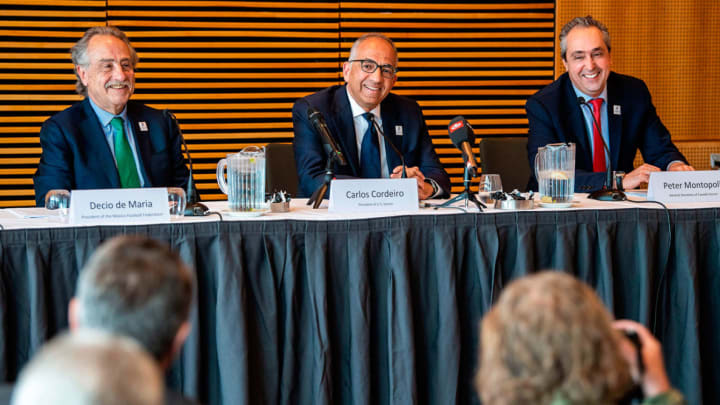USA's Joint Bid Makes Final Play for Votes Ahead of 2026 World Cup Decision Day

MOSCOW — The United States will not be playing at the World Cup that starts on Thursday. We already know that. But what happens here on Wednesday will nevertheless have a massive impact on the future of soccer in the United States—for better or for worse.
On Wednesday, more than 200 member nations of FIFA will vote to determine the host of the men’s World Cup in 2026. The candidates to host the 48-team tournament are the so-called United Bid of the U.S., Mexico and Canada and the bid from Morocco. Voters will also have a third option (“none of the bids”). A simple majority will win. If “none of the bids” wins, it would reopen the bidding process to any country other than the four bidders—though most observers think that scenario is highly unlikely.
What’s at stake for U.S. Soccer? Plenty. After the colossal failure of missing out on Russia 2018, losing Wednesday’s vote to Morocco would be another giant kick in the teeth for the organization—and a redux of the U.S.’s upset loss to Qatar for the World Cup ’22 hosting rights back in 2010.
If the United Bid wins, on the other hand, U.S. organizers say it will take soccer to an even higher level on the American sports landscape, creating millions of new fans. Make no mistake, this is a U.S.-led bid. Mexico and Canada would host only 10 games each, while the U.S. would host 60 games, including every game from the quarterfinals onward. But the inclusion of Mexico and Canada has been crucial, bid leaders say, not least because a U.S.-only bid would have faced more opposition from voters around the world.
USMNT Closes Camp, Awkward Period With Nice Lasting Impression vs. France
On Sunday night, U.S. Soccer president Carlos Cordeiro met with a few media members at a hotel here and detailed the manifold trips he has taken around the world since February with his Mexican and Canadian counterparts. Their strategy, he said, went like this:
1. Work on getting votes in the Western Hemisphere, including Central America, South America and the Caribbean.
2. Make visits to countries in Asia, where neither North America nor Morocco have many natural ties, and try to win as many votes as possible from the continent’s five regions.
3. Turn its focus to Europe, which has closer ties to the U.S. and North America but still has some national federations that have announced they’re voting for Morocco.
That brings us, by the way, to France. Eight years ago, it was France that sunk the U.S. bid for World Cup ’22 when French executive committee member Michel Platini switched his support from the U.S. to Qatar—at the behest of then-French president Nicolas Sarkozy, Platini said—and convinced other voters to do the same. In April, French soccer federation president Noël Le Graët said France would support its neighbor Morocco instead of the United Bid. Some observers think Le Graët did so because French banks and construction companies stand to make millions off a World Cup in Morocco. But whether or not that’s true, if France tries to persuade other nations to vote for Morocco, the old U.S. ally could potentially sink the Americans’ World Cup hosting hopes for the second straight time.
For his part, Cordeiro said the United Bid had worked to try to persuade a few African countries, mostly English-speaking ones, to spurn an African bloc vote for Morocco. (The Moroccans have done the same to try to pick off some votes from the United Bid’s home region, Concacaf.) He added that the bid was set to meet in Moscow with the Oceania confederation, which has 10 votes and has been in leadership flux for the past year.
Who’s going to win the vote? Nobody is sure. The FIFA technical committee that visited both bids gave North America a 4.0 rating out of 5 and the Morocco bid a 2.7 rating. But you never know if the voters will bother paying attention to those ratings. They certainly didn’t in 2010 when the U.S. bid had a higher technical rating than Qatar. (The voting system now, of course, is different than it was in 2010. Instead of the now-renamed FIFA Executive Committee submitting the votes, it's one per FIFA nation.)
The verdict is expected in Wednesday’s pre-dawn hours in the U.S., and the magic number to win will be 104 votes. The New York Times even went so far as to create a “2026 World Cup Vote Tracker,” which doesn’t include that moving needle the Old Gray Lady used in the 2016 U.S. presidential election.
Ultimately, there’s only one piece of news that will matter on Wednesday for U.S. Soccer, and it’s a binary proposition. You’re either hosting World Cup ’26 or you're not. And the ongoing national soccer mood will depend on it.
Grant Wahl has covered soccer for 22 years at Sports Illustrated. His new book, Masters of Modern Soccer, details the craft of soccer position by position. You can order it here.
